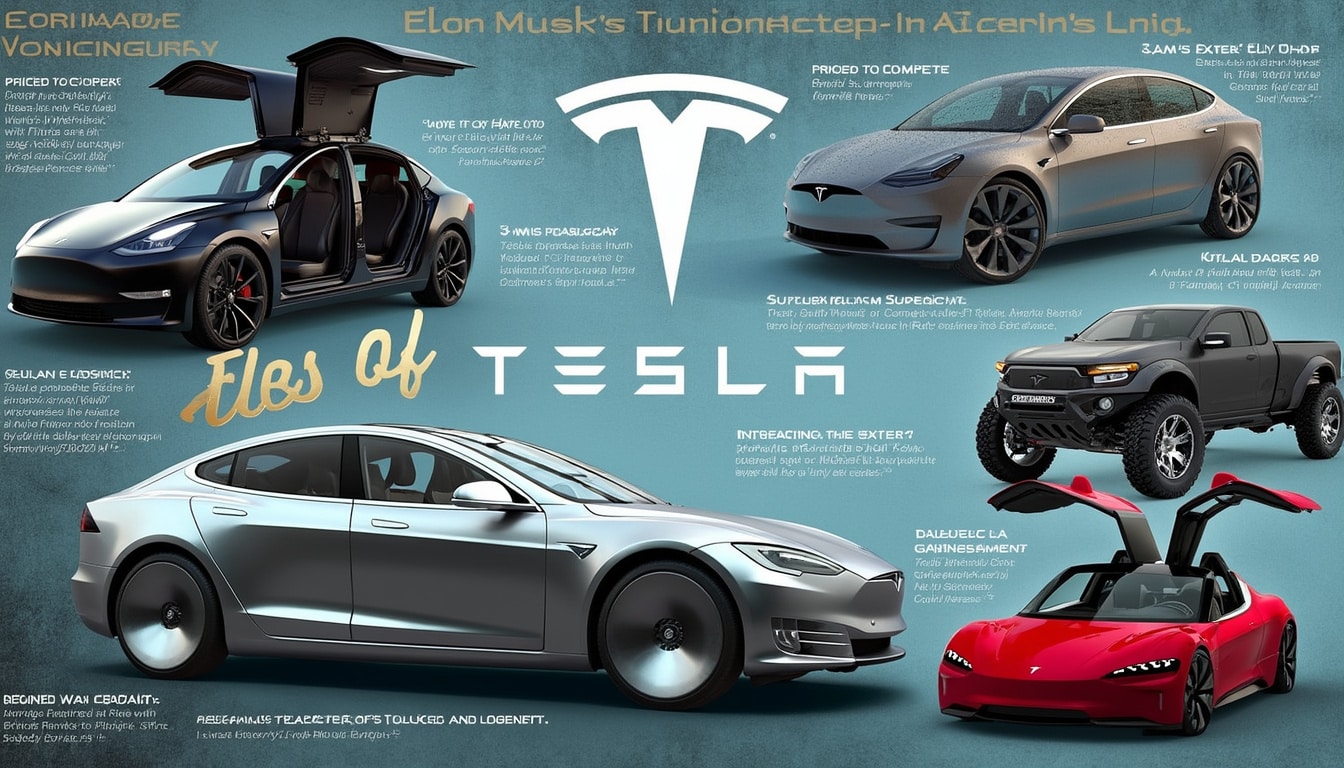Recent events have ignited fierce discussions surrounding the incredible yet controversial realms of Tesla and SpaceX, largely spearheaded by their infamous CEO, Elon Musk. Critics have not merely raised eyebrows; they have taken aim at Musk’s ventures, scrutinizing Tesla’s challenges within the electric vehicle segment while simultaneously finding humor in SpaceX’s latest exploits. A notable figure analyzing these occurrences is Greg Gutfeld, who seamlessly blends his keen observational skills with a dose of humor in addressing electric vehicle controversies and the aerospace industry’s unique challenges.
This article will delve into the multifaceted criticism directed at Tesla, punctuated by media analysis on the satire surrounding SpaceX’s endeavors. We will explore Gutfeld’s insights and the public’s varied reactions to Musk’s bold strategies, all while providing a comprehensive picture of the automotive brand comparison amid a tide of jokes, commentary, and scrutiny.
The Tesla Criticism Landscape
The electric vehicle market has witnessed a booming interest over the past decade, with Tesla at the forefront of innovation and environmental consciousness. However, this upward trajectory hasn’t come without its challenges. Critics have been vocal about Tesla criticism, particularly concerning manufacturing delays, safety issues, and service deficiencies. Despite the company being a market leader, there seems to be an undercurrent of skepticism about whether Tesla can sustain its dominant position in the face of increasing competition.

Manufacturing Challenges
At the heart of the criticism lies Tesla’s manufacturing prowess. The company has faced numerous hurdles, particularly in ramping up production for their latest models. Reports have emerged detailing delays and quality control issues, raising questions about Tesla’s ability to keep pace with the soaring demand for electric vehicles.
Interestingly, the media analysis surrounding these challenges reveals a growing sentiment among analysts who argue that while Tesla leads the electric vehicle segment, it may not be immune to issues that plague traditional automotive giants such as General Motors or Ford. Gutfeld’s insights reflect this; he humorously notes that “Even in the electric car race, it seems that old-school hiccups still haunt the new kids on the block.” Indeed, critics are quick to compare Tesla’s sophisticated technology with the long-established practices of older automotive brands.
Safety and User Experience
Compounded with manufacturing delays are concerns about safety features. Critics argue that Tesla’s reliance on cutting-edge technology doesn’t always translate to improved safety for drivers. Incidents involving Autopilot and accidents have heightened scrutiny on how these vehicles perform under pressure. Gutfeld humorously describes these incidents as “a new age of rollercoaster rides,” indicating that while technology can be thrilling, it may also come with unpredictability.
The automotive brand comparison continues as stakeholders point out that traditional manufacturers have a richer history of addressing safety recalls and regulatory requirements. In this light, every hiccup or crash involving a Tesla is magnified and becomes fodder for the media. The narrative surrounding Tesla could suggest that the company is using its innovative approach as a double-edged sword, where technical prowess invites both admiration and skepticism.
SpaceX: Comedy in Aerospace?
Much like the Tesla scenario, SpaceX is lauded for its remarkable achievements and forward-thinking aspirations, yet it is no stranger to setbacks and failures. These moments often unveil a lighter side of technology, showcasing the peculiar resilience of the aerospace industry through rocket launch humor

The Role of Humor in Innovation
Gutfeld and various platforms have harnessed the potential of humor in addressing aerospace failures. Tackling the fallout from SpaceX launch mishaps, he remarks, “At least it wasn’t just an expensive firework show!” Such commentary humanizes the engineers’ ambitious pursuits and underscores the idea that mistakes are part of the journey toward groundbreaking discoveries. While many may see failure as a roadblock, Gutfeld sees them as learning moments wrapped in laughter.
The comments surrounding these mishaps take on a duality; instead of merely criticizing SpaceX for failed launches, many use them as a reflection of the bold risks associated with innovation. The aerospace industry thrives on pushing boundaries, and Gutfeld captures this audacity with deft humor.
Media Perspectives on SpaceX’s Ventures
Media analysis and commentary often juxtapose the humorous elements with serious discussions regarding technology advancements. The interplay of risk and reward in the aerospace sector provides fertile ground for media stories that not only entertain but also educate. Many anchors offer technology satire while dissecting the intricacies of rocket science, mirroring Scott Kelly’s phrasing: “In exploration, every launch is a leap of faith.”
This fusion of delivery has prompted audiences to re-examine their perspectives on space travel. Uncovering the marvels of launching rockets and exploring outer space can be marginalized by the focus on the occasional explosion. In this landscape, Gutfeld’s insights resonate, drawing attention to the fine line between failure and progress.
Public Reactions: The Gutfeld Effect
The discussions surrounding Tesla and SpaceX have gone beyond traditional critique, as public reactions fluctuate between admiration and disdain. Gutfeld’s humorous lens in addressing these topics has sparked both laughter and thought among viewers. His precision in poking fun exhibits an understanding that deep-rooted sentiments toward Musk’s ventures are deeply intertwined with societal narratives about innovation, risk, and celebrity culture.
Observations indicate a strange phenomenon: the more outrageous the situation, the more laughter it elicits. Gutfeld’s trademark jibes have captivated viewers’ attention, as they transform everyday criticisms into entertainment spectacles. The aerospace industry jokes resonate, showing that laughter can catalyze contemplation. Adopting humor lightens the serious tone often associated with technology discourse.
The Balance of Criticism and Support
Moreover, public figures also weigh in on Musk’s endeavors, often offering splits between criticism and support. Tweets and memes abound, highlighting the duality of perspectives on his ventures. Critics passionately question the sustainability of his vision, while ardent supporters champion the breakthroughs he has made. Gutfeld represents the intersection of critique and admiration, frequently reminding viewers that in technology and innovation, nothing is absolute.
As Musk continues to drive his companies into uncharted territories, the division of opinion remains fierce. Gutfeld’s ability to shine a humorous light amid tension serves as a catalyst for discourse, echoing broader themes about how society perceives disruptors.
Reflections on Innovation and Celebrity Culture
The relationship between Elon Musk, Tesla, and SpaceX navigates a complex path marked by innovation and celebrity culture. Musk’s persona, steeped in ambition, has garnered both dedicated followers and relentless critics. Amidst the criticism, Gutfeld reminds viewers to consider the larger implications of Musk’s pursuits on society and industry.
Cultural Commentary on Disruptors
Gutfeld’s cultural insights illustrate that disruption instigates prevalent reactions — admiration compounded by skepticism. Critics question whether Musk’s lifestyle and public persona contribute positively to the narrative surrounding innovation; is he an admirable visionary or a chaotic disruption?
Scholars and commentators dissect how Musk’s approach to leadership influences perceptions and policies within the broader technology and aerospace domains. His tweets and public statements often fuel discussions about ethics and corporate responsibility. Yet, despite such criticism, the allure of his ventures captivates many. While many observe the struggles of Tesla and the humor surrounding SpaceX, some recognize these endeavors as symbolic of ambition in the modern age.
Final Thoughts on Technological Growth
As we navigate the ever-changing landscape shaped by technology, Gutfeld’s humorous insights provide valuable perspectives on the interplay of electric vehicle controversy and aerospace advancements. Embedded within laughter lies deeper considerations about the roles of innovation, leadership, and public perception.
| Company | Key Features | Industry Position | Public Perception |
|---|---|---|---|
| Tesla | Electric Vehicles, Autopilot Technology | Market Leader | Mixed Criticism and Admiration |
| SpaceX | Reusable Rockets, Mars Exploration | Innovative Pioneer | Admiration with Satirical Jokes |
The dialogues generated by figures like Gutfeld exemplify how humor can provide a lens to understand the complexities surrounding Musk’s ventures. Attention is drawn to where crossover exists between technological advancement and public understanding, revealing an intricate tapestry woven from aspiration and critique. As the world watches, laughter, skepticism, and admiration continue to shape how we perceive technological giants like Tesla and SpaceX.




Leave a Reply